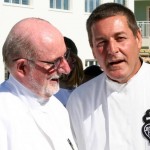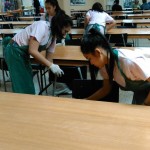By now most people have their gardens planted though many were caught by that surprise frost. But we plant the seeds, water the soil and wait.
In today’s gospel Jesus is teaching from a boat but we can be sure that most of his listeners were people who lived off the land, farmers and sheep and goat herders. The farmer scatters his seeds for planting and then waits. While he sleeps and works the earth does it work on the seed. With its warmth it softens the hulk of the seed and allows the seed to sprout and grow – without the farmer knowing how. After weeks of growth comes the harvest. This whole process from planting to harvest, depends on sunlight, good soil and rain. The farmer is at the mercy of the elements. Think of the crops that could be lost this year in California because of drought and in the Midwest because of rain or the early frost that hit the wine region here in Ontario.
Jesus uses the example of the mustard seed, the smallest of all seeds. From its tininess grows a plant large enough to provide nesting for birds and food for the family.
When each one of us was baptised we were given the seed of glory, our relationship with God. That seed will reach its full capacity when we die, when that seed is harvested. Here is a way of applying today’s parable to ourselves.
When we come to that point in our lives when we open ourselves to receive God as Lord and Jesus as our Savior we are just at the beginning of our journey of faith. It is like that littlest seed but it is meant to grow and it will grow if we don’t give up on ourselves, if we don’t let our faults and failing think we are nothing in the eyes of God, if we bring ourselves to trust the truth that God is not finished with us yet.
Through our simple acts of love and care, our willingness to accept others just as they are, through our times of silent prayer or our participation in Sunday Mass, through our receiving the bread of life or through are being reconciled with God we stretch our branches as we grow to full maturity in Christ, as we put on Christ. It is the little things in our lives that we can do great things. That cup of water given in Jesus’ name can be anyone of those little things, those acts of random kindness we do for friends and stranger. But every day we are called to grow in God’s love and life so that God may see and love in us what he sees and loves in Christ.
Plants that grow by forced growth don’t last that long. Nature has its own pace and so does grace, we grow gradually into the likeness of Christ. Life is slow and subtle. Love takes time to show and grow. In life, little acts count. In fact, that is what a life is all about, a long parade of moments deceptively inconsequential.
Remember that song from the musical Godspell, Day by Day. Day by day, day by day O dear lord three things I pray, to see thee more clearly, follow they more nearly, love thee more dearly – day by day.
St. Paul tells us we walk by faith not by sight. We may not see the results of the good things we do and we don’t need to, God knows whether or not we are growing, growing into a deeper relationship with him, growing into a greater likeness to Christ.
We’re told that during her trial Joan of Arc was asked one of her inquisitors if she was in the state of grace. She answered ‘if I am, I pray God keep me there, if I am not, I pray God put me there.’ If we wonder whether or not we are growing in the life of God and the likeness of Christ we can answer ‘if I am I pray God increase my growth, if I am not I pray God help me grow.
 Founded by St. Paul of the Cross, every Passionist takes a special vow to spend his or her energies in promoting remembrance of the sufferings of Jesus, the memory of the Cross, and reflection of the meaning of the Cross for the world.
Founded by St. Paul of the Cross, every Passionist takes a special vow to spend his or her energies in promoting remembrance of the sufferings of Jesus, the memory of the Cross, and reflection of the meaning of the Cross for the world.




